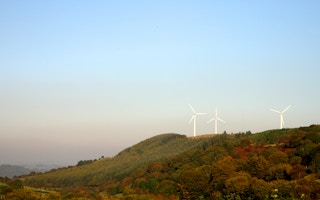In its white paper on a 2030 framework for climate and energy policies released today, the EU announced an overall target requiring renewable energy to supply some 27 per cent of the EU’s energy by 2030 but did not set country-specific targets.
To continue reading, subscribe to Eco‑Business.
There's something for everyone. We offer a range of subscription plans.
- Access our stories and receive our Insights Weekly newsletter with the free EB Member plan.
- Unlock unlimited access to our content and archive with EB Circle.
- Publish your content with EB Premium.
This is being viewed as a definitive sign that the EU is ditching its climate protection goals as well as losing its leadership role in climate policies.
In fact, the opposite is true. So long as the EU has a functioning emissions trading scheme and is serious about bold climate action, renewable energy targets are bad policy for five reasons.
First, it’s time for support to clean energy to mature into a support for innovation and for up-and-coming technologies. Government support for renewable energy through the “20-20-20” climate and energy package has done what it could: In Europe and elsewhere, if a higher carbon price is provided through tighter caps, zero rated renewable energy can already compete and beat fossil fuel energy. Job done. Move on.
“
While renewable energy targets have stimulated demand for clean power and caused the price of production to come crashing down, they force energy generators to build capacity to meet targets, not to maximize profit. They don’t help to build a competitive low carbon economy
Second, in setting renewable energy targets, the EU is abandoning a technology neutral stance and betting on specific technologies and industries. This is wrong. Government must be technology neutral. It must set the rules and allow those who are better qualified to assess the risks and benefits and invest accordingly. It is impossible to precisely predict how the energy sector is going to develop and Governments must reject the impulse to do so. The Government’s role is to create a long term stable framework which is designed to ensure that the precious commodity which clean air is has a price which increases in real terms over time. Only then will investors be able to make a convincing case to their shareholders to invest in low carbon technology. Setting renewable energy targets undermines this framework.
Third, while renewable energy targets have stimulated demand for clean power and caused the price of production to come crashing down, they force energy generators to build capacity to meet targets, not to maximize profit. They don’t help to build a competitive low carbon economy. If it is more profitable to invest in solar power in Spain and in wind power off the coast of the UK, then German, French and Italian money should flow to these markets.
But arbitrary targets lead to renewable energy capacity being diverted to the wrong place at the wrong time. If solar gives a better yield in Spain than in UK, what is the point of paying industry to install solar panels in UK? If the UK has 40 per cent of Europe’s wind energy, why are we erecting wind turbines in Germany? A Europe-wide efficient low carbon energy system will create jobs and build renewable energy capacity where it provides the highest returns, assessed as a combination of electricity price and net carbon benefit and not as a combination of a power price and a compliance with a Government target.
Fourth, Big Oil continues to invest billions in exploring and producing more gas because their shareholders demand profits. As and when a properly functioning European emissions trading market imposes a strong and rising carbon price which makes renewable energy more profitable, Big Oil will want to do what their shareholders tell them and investments in fossil energy will decrease, dramatically and suddenly.
Renewable energy targets cannot deliver this result. Who said the stone age didn’t end because it ran out stones? Our affair with fossil fuels won’t end because we ran out of fossil fuels. It will run out because alternative sources of energy become more attractive and that will happen when they become consistently cheaper.
Fifth, clean energy targets have done their modest bit to stimulate innovation and today, it’s our capital markets that are letting us down. The EU Commission is rightly turning its attention to this issue. Global climate and energy markets need a properly functioning emissions trading scheme which prices greenhouse gas emissions at a level which promotes innovation and technology change.
Low prices which allow lignite – the dirtiest type of coal – to be burnt are indeed a total failure but I am willing to bet that the day after the long-term price of carbon goes up, the lignite will go out. With a proper carbon price we can look forward to an energy network where renewables no longer displace nuclear; where hard-pressed consumers throughout Europe no longer pay astronomical feed-in tariffs to a small number of investors; and where emission permits are no longer so cheap that it’s more profitable to burn lignite.
The EU Commission is perhaps not credited often enough when it’s right, but it is very right this time: Zero rated renewable energy should be able to compete with fossil fuels as long as there is a strong and rising price for carbon. Renewable energy targets are bad policy because they distract from this goal.
Follow @assaadrazzouk on Twitter. This article first appeared in The Independent.











